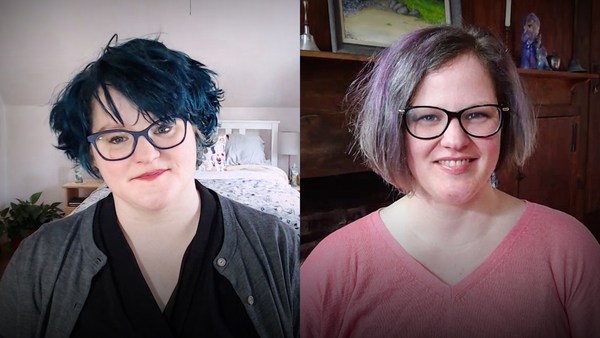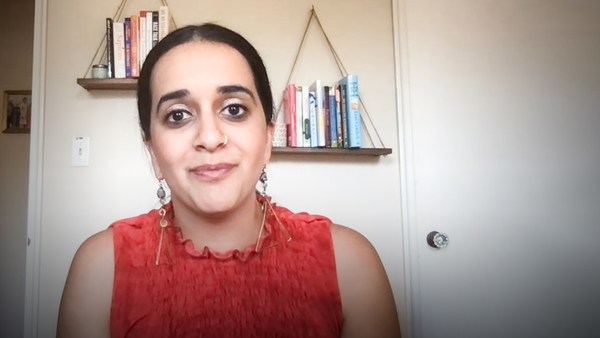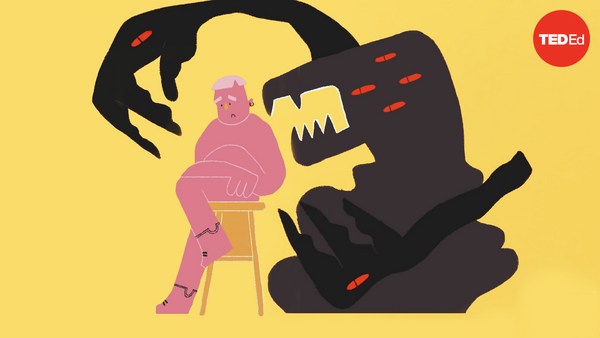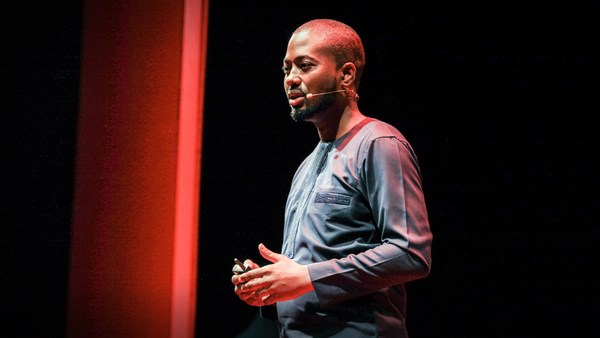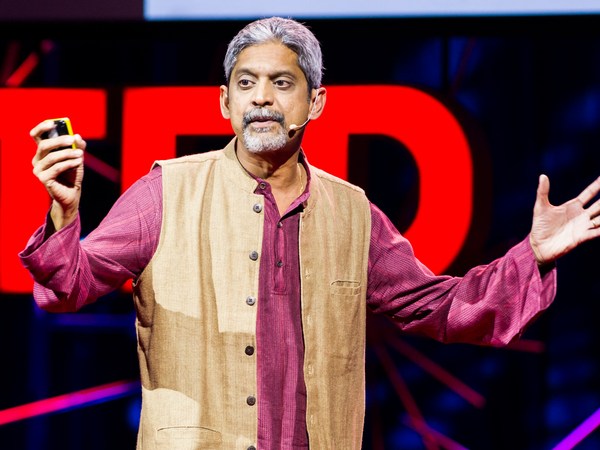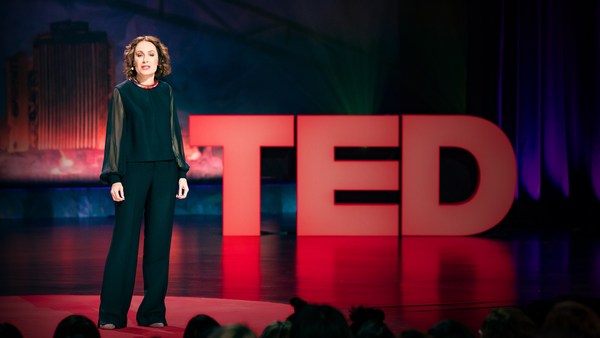[How to Deal with Difficult Feelings]
Cloe Shasha Brooks: Hello, welcome. You are watching a TED Interview series called "How to Deal with Difficult Feelings." I'm Cloe Shasha Brooks, your host and a curator at TED. Now I will be speaking with Valerie Purdie-Greenaway, social psychologist and Columbia University professor. She directs the Laboratory of Intergroup Relations and the Social Mind, where she researches the us-versus-them mindset with the goal of fostering understanding between groups. And she has wisdom to share about the relationship between feeling like an outsider and anxiety. So let's bring on Valerie. Hello, Valerie, thank you for being here. One of the things I've been excited to ask you about is just, you know, you talk about how there's two ways of seeing anxiety, right? Chronic anxiety and context-based anxiety. So can you define the two for us?
Valerie Purdie-Greenaway: There's two ways of thinking about anxiety. I think the first way that people traditionally think about anxiety is chronic anxiety. We are still in the midst of a pandemic. People are anxious. Some others might think of anxiety in terms of their personality, you know, their micromanagers, and these kinds of anxieties are sort of everyday anxieties that are with us for a long period of time. What I study is another kind of anxiety that other people may not be aware of. And this is the anxiety that comes from being part of a social group, whether it's your race, your ethnicity, your gender, your sexual orientation, your size, and walking around the world and sort of bumping up to environments where you're stereotyped, where you're "otherwise-d," and that context makes you feel different. And in that moment, you can feel it's the same biological kind of anxiety and stress, but it comes from the context. So I study the kind of stress, anxiety, frustration that stems from being a member of a group that can be stereotyped, and I study the kinds of contexts that make that happen, whether it's at work, at school, church, in your synagogue, you know, all of the types of contexts that can either intentionally or inadvertently make us feel otherwise, which causes that anxiety.
CSB: Yeah. And so, let's say someone's dealing with anxiety in association with a specific context, like being the only person of color in a classroom or the only woman on a team at work. What would you suggest as strategies for managing that anxiety?
VPG: The first thing is to just recognize that it's not you. If you feel stress, you feel anxiety, it's not you. There's not something wrong with you. There's something wrong with the context. The second thing is sort of deciding: Is it really worth it? Do you actually care? Because not every environment really matters. Once you contextualize, once you understand it's not you, you have to create a system of support around you to kind of fact-check your experiences. For instance, do you have a mentor who is in a similar situation, who came some years before you? When you talk to them, they can help you to understand that it's not you. They can help you fact-check. They can help you navigate what's happening.
I think the other thing which comes out of some research that I have done is when you situate that moment relative to who you are more broadly -- I am bigger than this moment -- sometimes those kinds of affirmations can be incredibly helpful in that moment for sort of reducing that stress.
CSB: Well, let's take one of our audience questions. So from LinkedIn, someone asks, "What can we do to best support people in our lives who are suffering from context-based anxiety?”
VPG: Oh, that's a great question. The question of what we can do to support others in our lives that are experiencing context-based identity is important because oftentimes, it's undetectable. One of the most challenging aspects of a context-based stress -- the scientific term is called "stereotype threat" -- the challenge with that is you have this physiological feeling. You might feel stressed, you might feel anxious, you might be overworking. Are you working at two and three in the morning, like, overworking on a presentation? But the problem is, you might not be able to actually detect it in others. You can oftentimes understand what situations a partner or person or friend is going into ahead of time and sort of sharing this idea that when you're in contexts where you are a solo status, you're the only one, this is something that could happen, this is an experience you could feel. It's not you; it's a common situation. I have found over and over and over again, just taking the heat off of an individual to sort of place it back where it's supposed to be in the context is incredibly helpful.
CSB: That's interesting and valuable. I mean, one of the things that feels connected to that, too, is obviously, being in these context-based, anxiety-producing situations can create anger and frustration, especially for those who have been affected by violence or injustice. Can you can you talk more about that flow from anger and frustration to anxiety?
VPG: Violence, frustration is, these days, far too familiar to many of us. When we think about all that has come out of George Floyd, we think about the continuing challenges that women face in the workplace, we think about the trans community, and what they're dealing with in terms of athletes and athleticism and whether or not they're considered truly part of a sport, particularly in women's sports -- there are so many different identities that are being challenged right now. And what we find in our research is that there's a natural flow from anxiety, stress, questioning whether, "Is it something about me?" "What is it about my group?" to the shift in understanding that society is seeing and treating you differently, and that causes anger, and that causes frustration. The problem with this is, at the physiological level, it's still stress, and stress is debilitating. It keeps us up at night. It keeps us overeating. It keeps us undereating. You look at the early onset of cardiovascular disease. The problem is, stress is debilitating. So even though those moments of anger may even make you feel like you can do something, you feel empowered as a group, it still can erode our health. And so when I think about inclusive societies, I think about it from a justice perspective. I also think about it from a health perspective, because it's all linked together.
CSB: Absolutely. Yeah. We have another question from the audience. Let's bring that up. From Facebook: "Is it possible to use anxiety in a positive way?"
VPG: It is absolutely a good idea. And when you understand that you can leverage the power of anxiety in a positive way, you can do a lot of different things. So, for instance, there's a relationship between anxiety and performance. There's lots of research on this. It's sort of an old idea. And the idea is that some anxiety is good. My doctoral advisor, Claude Steele, after giving thousands of talks and writing books, I would ask him, "Do you still get anxious on the first day of class?" And he said to me, "Valerie, when you stop being nervous the first day of class, it's time to retire."
CSB: (Laughs)
VPG: Because that's a good kind of anxiety, right? But the problem is, that anxiety can also shift to being debilitated, where you're just stressed, you start to feel frazzled, you start to feel like your brain isn't working properly. And so some anxiety is good. It's sort of like the sweet spot of anxiety. And then if you keep going, it can become debilitating and erode performance. So it's the back-and-forth between some is good, too much is bad, that we need to be thinking about, both as ourselves as individuals and also when we're part of organizations.
CSB: We have a new question from the audience. Let's bring that one up, please. Thank you. OK, Kristin Sánchez Salas from LinkedIn says, "What can you do if your context-based anxiety is provoked by a colleague, client, superior or someone you work with regularly?”
VPG: My strategy is: first time, forgiveness. Sometimes, fact-checking: What is it that you actually heard? What is it that someone said? Trying to understand someone's intentions, that's, I think, the first step. The second step is, this is something that is not going to be tolerated, because it impacts your ability to thrive, and it impacts other people who are members of their group. So this becomes a manager issue. This becomes a leadership issue. And true inclusive leadership is taking a stand and saying "We're not doing this," and then setting the groundwork so it doesn't happen again.
CSB: Yeah, that's really great advice. But we're almost at the end, so I'm just going to ask you one final question leading from that, which is: If you're told that you are the cause of context-based anxiety, what's the first thing you should do?
VPG: If you're told that you are the cause of context-based anxiety, remember my face: it's not you, it's the situation that you are in. Trust your judgment, particularly if you have experienced solo status once, you've experienced it again. If you've been stereotyped once, you've probably had this experience over and over. So trust your intuition that it's not you bringing paranoia to the workplace, that these kind of stereotypes and otherisms are rife and alive. I think that's the first thing. And then the second thing is having these layers of support around mentors and sponsors, who can tell you that you are doing just fine, there's something amiss in this environment. That layer of support is incredibly important. It's important for everyone. But if you're a member of a social group that contends with these kinds of challenges in society, that layer of support that you can go after in terms of creating robust social networks, that is a key.
CSB: This has been so valuable, Valerie. Thank you so much for taking the time to talk with me.
VPG: Thank you so much.
